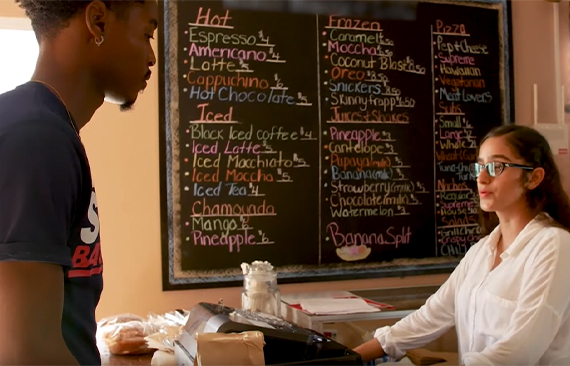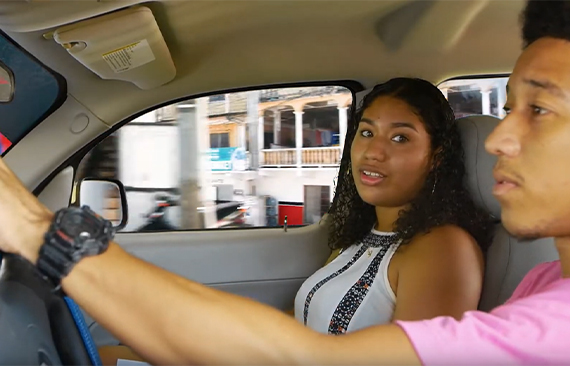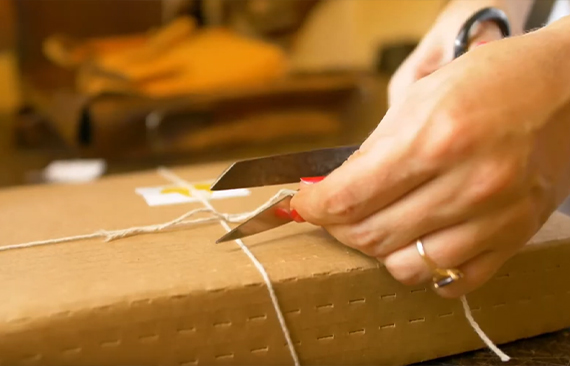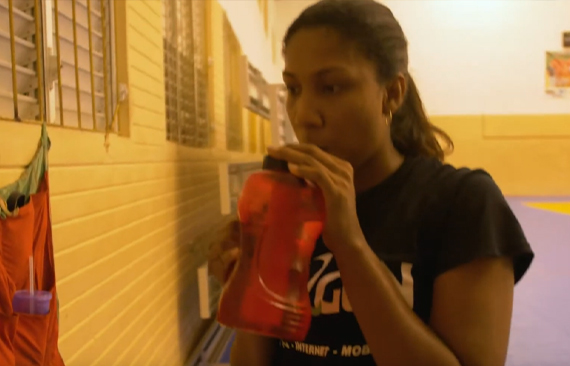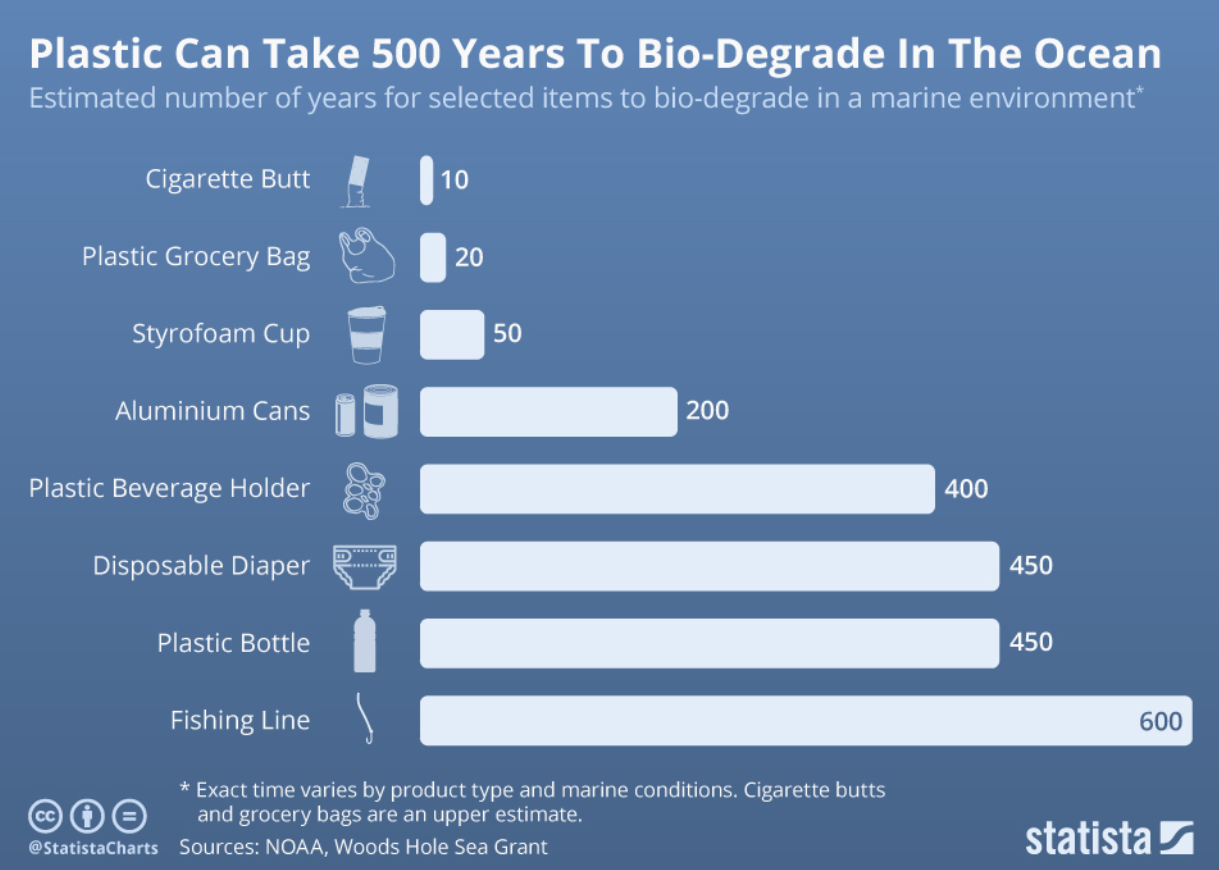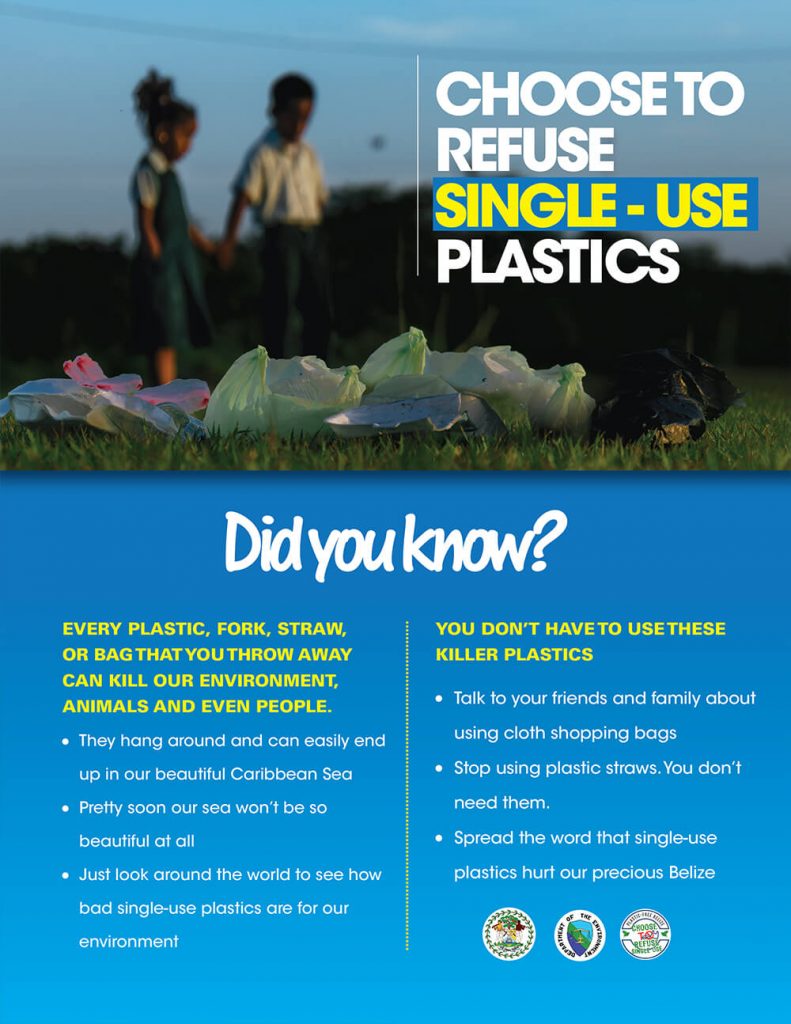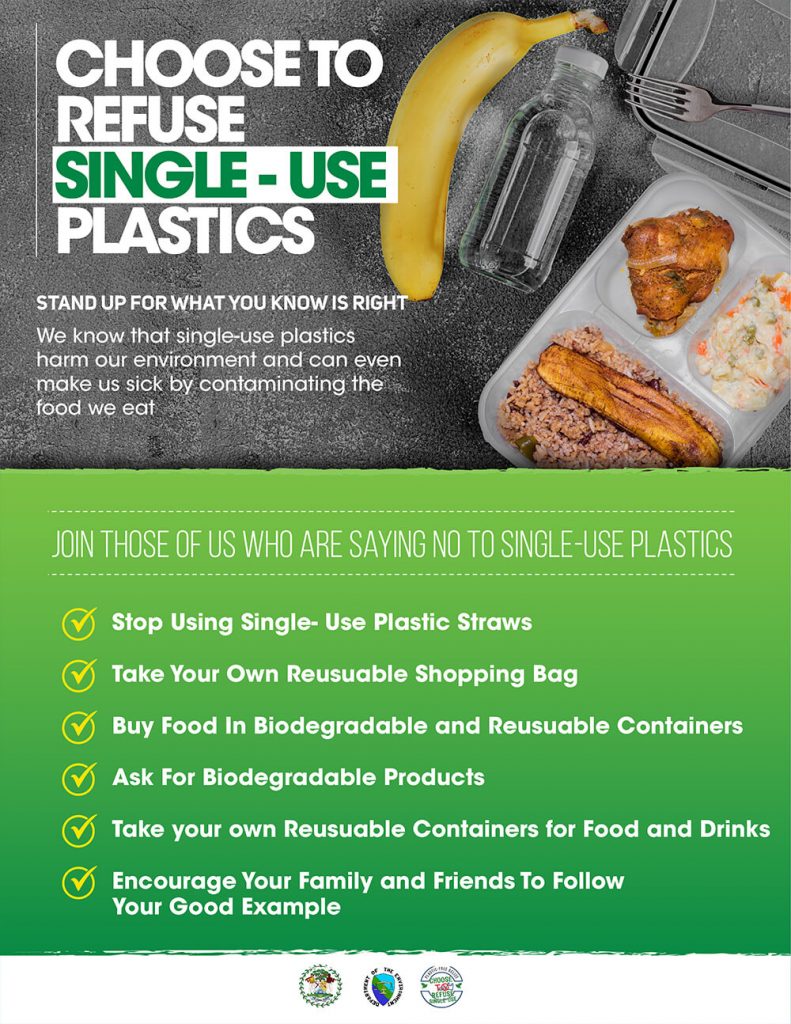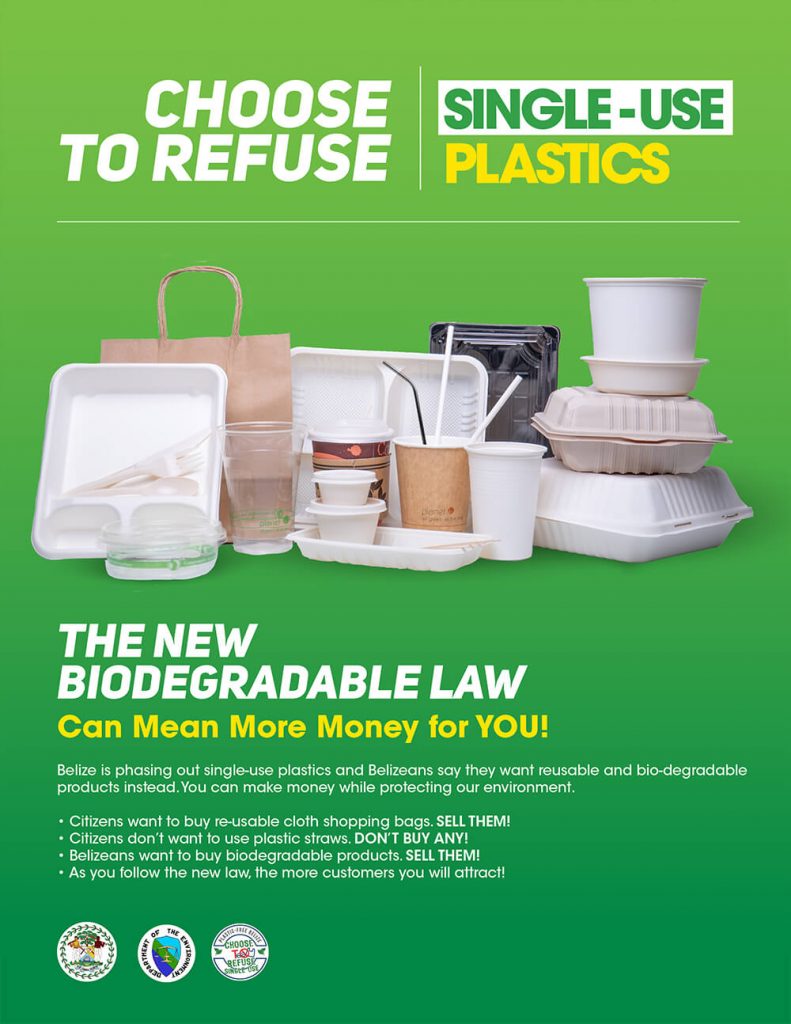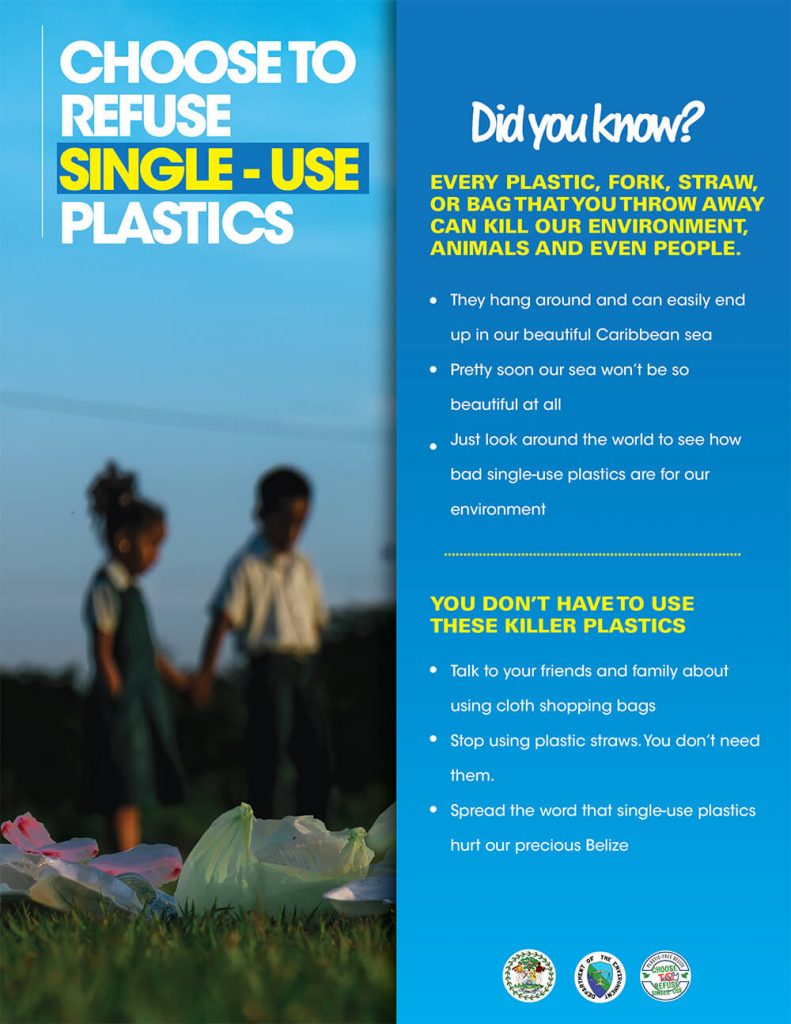7552 Hummingbird Highway,
Belmopan City, Belize, C.A.
Phase-out of Single Use Plastics
Pollution from single use plastics has become a major problem globally and in Belize. Recent scientific studies have shown that plastics and/or microplastics has entered all levels of the food chain within our oceans; and in Belize is impacting over natural environment, drainage, and waterways. A 2017 assessment commissioned by the Department of the Environment found, that over a three-year period, Belize annually imported over 200 million pieces of single use plastic bags and 52 million pieces of styrofoam & plastic food containers, and locally produced and manufactured an estimated 35 million single use plastic bags and 5 million pieces of styrofoam. This roughly equates to each Belizean citizen using on average eleven (11) single use plastic bags and three (3) pieces of styrofoam per week over a one-year period. To reduce this use of single use plastics and styrofoam, and protect the Belizean environment from continued plastic pollution, the Government of Belize on 20 March 2018 announced the intention to phase-out of single use plastics and styrofoam as of 22 April 2019. The intent of this webpage is to provide information on Belize reducing single use plastics.
What are “single use plastics”: Single Use Plastics, commonly referred as disposable plastics, are plastics intended for one time use before they thrown away or recycling. In many cases, single use plastics are used as packaging materials. Most plastics and styrofoam are derived from petroleum, meaning that they are a petroleum-based product. For the purposes of the paper: Single Use Plastics refers to both plastics and styrofoam.
Packaging Materials associated with single use plastics in Belize are composed of polyethylene, commonly referred to as plastics, and expanded polystyrene, commonly referred to by its most common brand name styrofoam. Polyethylene or polythene is the most common plastic in packaging and used for making plastic bags, plastic film, plastic bottles, etc. Expanded Polystyrene, locally referred to as styrofoam or foam, is commonly used for foam food containers, for example, clamshells, soup cups, foam cups, etc.
Why it is Important
Most Plastics do not biodegrade – meaning they do not breakdown / decompose as a result of natural processes or microorganisms into harmless substances into the natural environment.
Instead, plastics slowly breakdown into smaller fragments called “microplastics" and remain in the environment whether on land or in the sea. Plastics and styrofoam pollute the environment and end up in our drains, rivers, coastlines, and oceans. In 2018, UN Environment estimates that 8 million tons of plastic end up in the ocean’s each year.
Styrene can leach from polystyrene; this can lead to nervous system damage and cancer.
Disposal of plastics costs the tax payer more money for garbage disposal because plastics do not degrade rapidly and fills up a disposal landfill, reducing the lifespan of the disposal site.
See below for a chart on estimated rate of decomposition below: all data source from NOAA –
How Belize is moving towards reducing single use plastics?
- The Government of Belize approved the Implementation Strategy and Action Plan to Phase-out Plastics and Styrofoam, Transition to Green Products, and Promote Recycling on 10 July 2018.
- The Implementation Strategy and Action Plan to Phase-out Plastics and Styrofoam, Transition to Green Products, and Promote Recycling is being carried out by the Plastics and Styrofoam Task force.
Plastics & Styrofoam Task force Composition:
- Chief Executive Officer, Ministry of Agriculture, Fisheries, Forestry, the Environment, Sustainable Development, & Immigration (MAFFESDI) – Co-Chair
- Chief Executive Officer, Ministry of Tourism & Civil Aviation
- Ministry of Finance – Customs & Excise Department
- Ministry of Investment, Trade and Commerce – Investment, Policy, & Compliance Unit
- Department of Environment (Coordinator)
- Directorate General of Foreign Trade
- Belize Bureau of Standards
- Belize Solid Waste Management Authority
- BELTRAIDE
- Office of the Prime Minister – Economic Development Council / Public-Private Sector Partnership
| Expected Results/Outputs | Summary of Actions |
| Reduce & Prohibit Single Use Plastic | a reduction in the volume of single-use disposable plastics and styrofoam becoming waste via regulatory restrictions on importation, production, manufacturing, sale, and possession, through amendments to the Pollution Regulations under the Environmental Protection Act; |
| Better data on single use plastic | improve national data quality to aid decision-making and the development of policy for strengthening and promoting the recycling, agro-productive and manufacturing sectors; |
| Promote green products (transition) | Transition to using Greener (environmentally-friendly) products, by promoting investment, research and development, production and importation; |
| Promote Ownership | engendering national ownership and pride in transitioning to green products; and |
| Monitor | monitoring and evaluating Belize’s transition to green products via tracking changes in: importation and production practices, waste stream composition, and consumption habits, attitudes and perceptions relating to single-use disposable plastics and styrofoam products. |
What is Belize phasing-out in 2019?
Belize will commence the phase-out of single use plastics in April 2019. Specific items targeted as part of phase one are found in the table below:
- Styrofoam pellets
- Styrofoam Clamshells
- Styrofoam Food Containers
- Styrofoam Soup Containers
- Styrofoam Plates
- Styrofoam cups and lids, etc.
- Plastic forks, knives, spoons, sporks, etc.
- Plastic plates, bowls, cups, tumblers
- Single use disposable drinking straws
- Office of the Prime Minister – Economic Development Council / Public-Private Sector Partnership
N.B. – Details on legislation and enforcement dates will be provided once legislation is enacted.
Video Gallery
